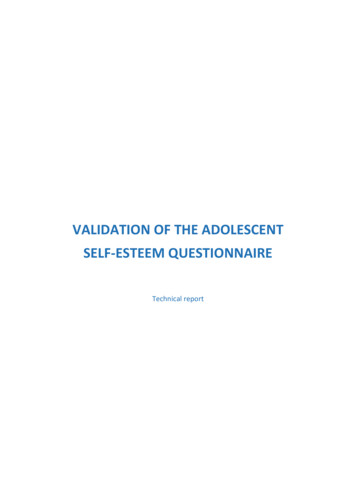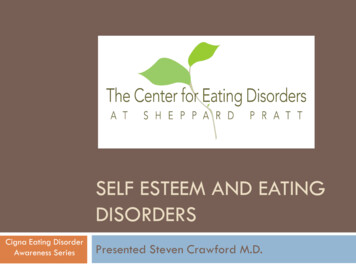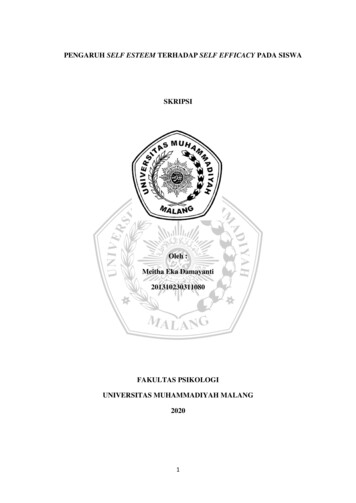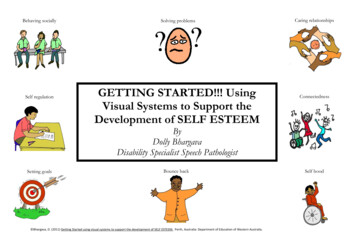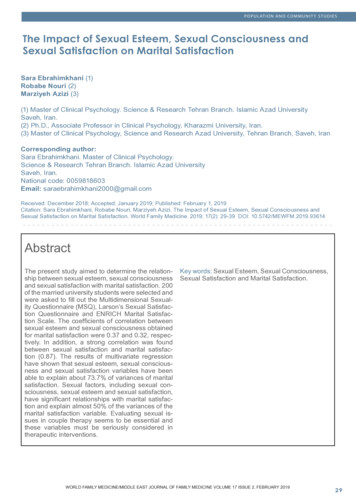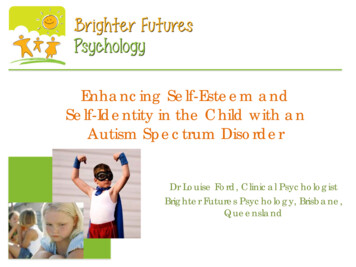
Transcription
Proceedings of INTCESS 2020- 7th International Conference on Education and Social Sciences20-22 January, 2020 - DUBAI (UAE)PARENTING STYLES AND SELF-ESTEEM OF ADOLESCENTS: ASYSTEMATIC REVIEWOlusolami Okunlola; Abiodun Gesinde; & Adedayo OdukoyaDepartment of Psychology, Covenant University, Ota, Ogun State, NIGERIAAbstractThe current paper was an attempt to find out the prevalent style of parenting among the reviewed studiesand establish the relationship between parenting styles and adolescents’ self-esteem. A systematic search ofPubMed, Science Direct and Google Scholar was conducted to identify studies that met the selection criteria.A total of 2,013 studies were identified out of which only 25 met the selection criteria. The study had a totalsample size of 7, 368, with mean age being 15.8 years. With three research questions guiding the study,findings reveal that the authoritative parenting style was prevalent among the studies reviewed. It alsoestablished a significantly positive relationship between the authoritative parenting style and self-esteem anda significant inverse relationship between authoritarian parenting style and self-esteem of adolescents.Furthermore, authoritative parenting style was found to have had the greatest impact on adolescent selfesteem; it enhanced the highest self-esteem levels of adolescents above other parenting styles. The studythus recommends parental skills training for parents of adolescents.Keywords: Parenting styles; self-esteem; adolescence; relationship; systematic review1. INTRODUCTIONThe period of adolescence, is that time when adolescents develop a unique sense of self and identity. Theirself-esteem which before this time has been majorly influenced by parental and family factors such asparental self-esteem, behaviours and styles; supportive home environment; parental encouragements anduse of praise; family members’ attitudes towards their successes and failures, among others (Dobrescu,2013, Okonkowo, 2013; Emam & Abu-serei, 2014); begin to fluctuate as they attain adolescence.Meanwhile, Adeusi, Gesinde, Alao and Adejumo (2014) have described adolescence as a time betweenages 11 and 21. Hence at this time, their experiences outside the home, such as with peers become animportant determinant of self-esteem (Harter, 2006). In sum, the family and peers of the adolescent aremajor contributors to adolescent self-esteem (Garcia & Santiago, 2017).Previous research had also established that the “stress and storm” that adolescents go through, make themengage in mood disruptions, risky behaviours, as well as parental conflicts. These three characteristics affecttheir emotional, social, and physical interactions with others; these in turn affect their self-esteem (Fiest,Fiest & Roberts, 2013). Gesinde (2011) reports that consistent evidence across studies showed that parentalemotional maltreatment of children contributed to negative self-concept of adolescents. The role of healthyself-esteem in the lives of adolescents cannot be over emphasized as it is very critical to their functionality.The role of healthy self-esteem in the lives of adolescents cannot be over emphasized as it is very critical toISBN: 978-605-82433-8-51341
Proceedings of INTCESS 2020- 7th International Conference on Education and Social Sciences20-22 January, 2020 - DUBAI (UAE)their functionality. Parents who are understanding and supportive tend to help their adolescents retainhealthy self-esteem (Niaraki & Rahimi, 2013). The act of seeking help, by the adolescents in this context, toovercome life challenges is certainly not a new phenomenon (Gesinde & Sanu, 2015).Research over the years has found connections between adolescents’ self-esteem and the style of parentingthey are exposed to (Henz, 1999; Wolff, 2000; Martinez, Garcia & Yubero, 2007; Driscoll, 2013). Parentingstyle is a psychological description of standard strategies that parents use in their child rearing efforts(Adimora, Nwokenna, Omeje and Umeano, 2015). Parenting style describes the approaches parents adoptfor the overall upbringing of their children. Different types of parenting styles have been identified: Positiveparenting (Walton, n.d); affectionless control (McCabe & Shaw, 2010); and the Baumrind Parenting Typology(Baurind 1971), among others. Of all these types of parenting styles, Baumrind typology has gained thehighest popularity.The Baumrind’s Parenting Typology is a unique classification of parenting approaches, which describeparents in four categories: responsiveness vs unresponsiveness; demanding vs undemanding (Baumrind,1967). These four, form the basic elements that shape parenting (Baumrind, 1971). In today’s parenting styleresearch therefore, four parenting styles are duly recognised; authoritative (high on demandingness andresponsiveness), authoritarian (high on demandingness but low on responsiveness), permissive (low ondemandingness but high on responsiveness), and neglecting (low on both demandingness andresponsiveness, Maccoby & Martin, 1983). The authoritative parenting style tends to present a balancedparenting approach that is high on warmth and communication and moderate on discipline and expectationsof maturity (Niaraki & Nahimi, 2013). It allows an open home environment which fosters great emotionalsupport, independence, social and academic competence, self-reliance for children and adolescents(Steinberg, Lamborn, Darling, Mounts, & Dornbusch, 1994; Akinsola, 2013; Garcia & Santiago, 2017).The authoritarian style on the other hand is dictatorial in nature, high in strict discipline, maturityexpectations, as well as parent-child communications. It is low in warmth and show of affection, low in childparent communication and hardly considerate of children’s opinion (Niaraki & Nahimi, 2013; Garcia &Santiago, 2017). Ultimately, the adolescents from this background are known to be anxious, withdrawn, withlower levels of wellbeing, and so on. (Steinberg et al., 1994; Bakar, Ahmad, Dolah, Halim & Anuar, 2012).Permissive style of parenting has few behavioural expectations for the child. It is indulgent, lenient, nontraditional and high in responsiveness, but low in control or exigency (Deshpande and Chiabari, 2013; Garciaand Santiago, 2017). Permissive parents are high in nurturance and acceptance but highly undemanding ofcompliance and conformity to standards (Driscoll, 2013; Gracia & Santiago, 2017). They are often too openand kind; and as long as a child’s action or decision does not bring physical harm, they accept and support,so as to avoid confrontation (Gracia & Santiago, 2017). Children from this background interestingly tend tobe friendly, sociable, creative and with a high level of wellbeing (Steinberg, et al., 1994; Bakar, et al., 2012).They are however often aggressive, verbally impulsive and highly confrontational, resistant when limits orboundaries are set for them and with lower levels of achievement (Steinberg, et al., 1994; Bakar, et al.,2012).The neglectful or uninvolved parenting style is low in both responsiveness and demandingness. The parentshardly supervise or exercise control and discipline over the children. Adolescents from this background oftenshow various forms of externalizing behaviours, such as delinquent acts, substance use, etc (Hoeve, Dubas,Eichelsheim, Van der Laan, Smeenk & Gerris, 2009).Parenting styles and its association with self-esteem of adolescents have received good attention in theliterature but limited to western and Asian cultures, leaving a major gap in African research in this area. InNigeria in particular, parenting style studies are still emerging and the few existing studies have focused onfinding links between parenting styles and several other outcomes among adolescents, and not self-esteem.Only the work of Aihie (2016) was found to have examined the self-esteem outcomes of various parentingstyles. This dearth in literature motivated the need to systematically review published literature focusing onparenting styles and adolescent self-esteem outcomes. The nature of systematic reviews has beendocumented to provide authentic evidence of available research in a specific area of research interest(Wright, Brand, Dunn and Spindler, 2007).The present study is therefore a systematic review of literature of primary studies that measured andreported relationship between parenting styles and adolescent self-esteem. The following research questionswere addressed in the study:a. What is the prevalent parenting style among the studies reviewed?ISBN: 978-605-82433-8-51342
Proceedings of INTCESS 2020- 7th International Conference on Education and Social Sciences20-22 January, 2020 - DUBAI (UAE)b. What is the prevalent relationship between parenting styles and self-esteem among adolescents?c.Which of the parenting styles had the greatest impact on the self-esteem of adolescents?2. METHODS2.1 Research DesignThe design of this study is a systematic review which allows one to harvest available evidences in a givenarea of interest based on past empirical studies.2.2 Sample DistributionThe total sample size for studies reviewed was 7, 368. The mean age of participants in the studies sampledwas 15.8. The distribution of the study locations of the reviewed studies was also indicated and representedby continents. As illustrated in figure 1 below:605056403020108124AfricaNorth AmericaSouth America128EuropeAustralia0AsiaFigure 1: Indicating distribution of study regions.2.3 InstrumentsMeasures for the two variables of concern in this study (Parenting styles and self-esteem) were standardizedmeasures and they varied across the studies. 13 different parenting style measures were identified. TheParental Attitude Questionnaire (PAQ) had the highest frequency (32%, n 8) (Martinez, et al. 2007; Aihie,2016; Bee, 2017; Garcia & Santiago, 2017). For self- esteem on the other hand, a simple frequency countindicated Rosenberg Self-esteem Scale (RSES) was the most popularly used measure (42% , n 11), withthe next popular being of Coppersmith Self-esteem Inventory (CSEI) (19%, n 5). This implies RSES is themost widely used measure for self-esteem (Figure 3 illustrates this).2.4 Procedure for data collection2.4.1. Search Strategy – to obtain data for this systematic review, three electronic databases weresystematically searched to identify studies that met selection criteria. They included Science Direct, GoogleScholar, and PubMed. No publishing date restrictions were included. Google scholar was used to handsearch reference lists of included studies. The following key words were included in the search:[(adolescent)] and [(self-esteem) OR (self-worth) OR (self-concept)] and [(Parenting styles)]. The searchyielded 2,013. These included journal articles, reviews and dissertations. Based on selection criteria, eligiblearticles were selected.2.4.2. Screening and SelectionI. Inclusion Criteria- Studies that met the following criteria were included in the studya. Study indicated clear measures of study variables (Parenting styles and Self-esteem). b. Study reportedcorrelations between parenting styles and self-esteem. c. Study participants included adolescents. d. Studycovered male and female participants. e. Study indicated clear sample size. f. Study provided full textaccess.ii. Exclusion Criteria: Encylopedias, view-points, commentaries, letters and qualitativestudies were excluded from the review.ISBN: 978-605-82433-8-51343
Proceedings of INTCESS 2020- 7th International Conference on Education and Social Sciences20-22 January, 2020 - DUBAI (UAE)2.5 Data analysis (Data Extraction and Synthesis)Data for this study were carefully extracted and stored in Microsoft excel format. The systematic searchreturned 2,013 records, out of which only 25 of them met the inclusion criteria and were retained forsynthesis. The basis for exclusion included duplicates, irrelevant data, viewpoints, letters, qualitative andexploratory studies were excluded. Studies with incomplete information were also excluded. These werehighlighted in Figure 4 above, and the overall characteristics of included studies were presented in table 1,below.Data extracted included the first author, year of publication, study location, study design, sample size,participants’ gender and mean age, measures of study variables (Parenting styles and self-esteem), styles ofparenting and the study outcome. Synthesis was conducted using simple frequencies and percentages.3. RESULTSResearch Question 1- What is the prevalent parenting style among the studies reviewed?Figure 2 – Distribution of parenting styles, showing the prevalentFigure 2 above illustrates the distribution of parenting styles as indicated by the studies in this review. Theprevalent style is the authoritative (78%), while neglectful parenting style was not prevalent in any of thestudies under review. 11% of the parents adopted the permissive style, while the authoritarian parents werealso 11% of the distribution.Research Question 2: What is the prevalent relationship between parenting styles and self-esteem amongadolescents?Figure 3: Showing consensus finding of the relationship between parenting styles and self-esteemamong adolescentsISBN: 978-605-82433-8-51344
Proceedings of INTCESS 2020- 7th International Conference on Education and Social Sciences20-22 January, 2020 - DUBAI (UAE)Findings from this review indicate that all the studies found a significant relationship between parenting stylesand self-esteem. As illustrated in figure 6 above, majority (n 18;72%), of the studies found a significantpositive relationship between authoritative parenting style and self-esteem; Some of them (n 5; 20%)however, found no relationship at all between them. For the authoritarian parenting style, only few (n 2; 8%)of the studies found a significant positive relationship with self-esteem, while majority (n 16; 64%) found aninverse relationship between them.For the permissive parenting style, while some (n 5; 20%) studies reported a significant positive correlationwith self-esteem, some others (n 7; 28%), reported an inverse correlation and others (n 7; 28%) reported nocorrelations between permissive parenting style and self-esteem. For the neglectful parenting style, no studyfound a significant positive correlation with self-esteem, while only a few (n 2; 8%), found an inverserelationship. Furthermore, a few others (n 2; 8%), found no correlation between neglectful parenting styleand adolescent self-esteem.Therefore, the prevalent relationship between parenting styles and adolescent self-esteem among thereviewed studies is a significant positive correlation between authoritative parenting style and self-esteemamong adolescents, which implies that the higher authoritative parents are, the more the self-esteem of theiradolescents. A significant negative correlation between authoritarian parenting style and adolescent selfesteem is also prevalent. This means that the more authoritarian parents are, the lower the self-esteemlevels of their adolescentsResearch Question 3: Which of the parenting styles had the greatest impact on the self-esteem ofadolescents?Figure 4– showing Parenting styles with highest self-esteem outcomesFigure 4 above presents the parenting styles outcomes on adolescent self-esteem. Only 15 of the reviewedstudies reported the specific impact of parenting styles on adolescent self- esteem. 40% (n 6) of themreported the authoritative parenting style as the style with the highest self-esteem outcomes. 27% (n 4) ofthe studies reported that adolescents from authoritarian families had moderate self-esteem levels, while 13%(n 2) from authoritarian reported low self-esteem. For the permissive parenting style, 13% (n 2) of thestudies reported moderate self-esteem among the adolescents, while the neglectful parenting style wasreported have enhanced low self-esteem among the study adolescents from 7% (n 1) of the studies. In thelight of the foregoing, the authoritative style of parenting has the greatest impact on adolescent self-esteemlevel.4. DISCUSSIONThe first research question was to find out the prevalent parenting style among the studies reviewed. Theresults showed 78% percent of the studies reported the authoritative parenting style as the prevalent style intheir studies. This implies that majority of the adolescents in this study; receive warmth, support andacceptance from their parents. It further implies that most of the parents in this study are flexible individuals,ISBN: 978-605-82433-8-51345
Proceedings of INTCESS 2020- 7th International Conference on Education and Social Sciences20-22 January, 2020 - DUBAI (UAE)who listen to their children when they have explanations towards not so desirable outcomes they exhibit fromtime to time (Garcia & Santiago, 2017). This result of the second research question aligns with previoustheoretical underpinnings which attempt to situate a significant contribution of parenting styles to adolescentself-esteem (Maccoby & Martin, 1983). Furthermore, the findings confirm the analysis of Baumrind (1991)who stated that the authoritative parenting style is the most associated with positive psychological outcomes(such as self-esteem) on the child.A good number of the studies reviewed also found a significant inverse relationship between authoritarianparenting style and adolescent self-esteem. This means the more authoritarian the parents were, the lowerthe self-esteem of the adolescents. According to Niaraki & Rahimi (2013), when parents get too strict,leaving no room for negotiations and simply hand down rules without room for emotional openness, there istendency for a child to develop low self-esteem. This low self-esteem may heighten during adolescencewhen interactions with peers become a major source of self-esteem reinforcement (Deshpande & Chhabriya,2013). Sankra (2007) argued that when children cannot confide in their parents and cannot express whatthey are going through, they tend to have a poor evaluation of their self-worth and could ultimately result intodrug use and various deviant acts.The results of the third research question showed that both adolescents from permissive parenting style andsome of the adolescents from the authoritarian showed moderate self-esteem levels. Those from neglectfulparenting backgrounds, as well as a few from authoritarian, however showed low self-esteem levels.Permissive parents are high in warmth and acceptance but low in control. They tend to be indulgent andhardly engage the force of discipline in their child rearing approaches. The result for neglectful parenting,which is the fact that neglectful parenting enhanced the lowest levels of self-esteem among adolescents,corroborates previous research, especially the works of Maccoby & Martin (1983); Baumrind (1991, 1996)and Darling (1999). These authors posit that neglectful parents are highly uninvolved and very low in bothresponsiveness and demandingness. They have no sense of connectedness to their children and overtimesraise adolescents that are runaway children, truants, with behaviour problems and generally poor in alldomains (Darling, 1999; Niaraki & Rahimi, 2013).ACKNOWLEDGMENTWe acknowledge the management of Covenant University for this conference sponsorship.REFERENCE LISTAdeusi, S.O., Gesinde, A.M., Alao, A. A, Gbadebo, O. A. (2014). Differential Effect of Behavioural Strategieson the Management of Conduct Disorder among Adolescents in Correctional Centres in Lagos State,Nigeria. Procedia - Social and Behavioral Sciences, 1-5.Adimora, E., Nwokenna, N., Omeje, J., Umeano, E. (2015). Parenting Styles and Attention Deficit Hyperactivity Disorderas Correlates of Academic Adjustment of In-School adolescents in Enugu State, Nigeria. Procedia - Social andBehavioral Sciences, 205,702 – 708.Aihie, O.Z. (2016).Perceived Parenting Styles as Correlates of Self-Esteem among Adolescents in Secondary Schools.International Journal of Educational Benchmark. 4 (1)96-106.Akinsola, E.F. (2013). Cultural variations in parenting Styles in the Majority World Evidences from Nigeria andCameroon. In Maria Lucia Seidl-De-Moura (Ed),Parenting in South American and African Contexts (PP. 79-96)DOI: 10.5772/57003.Bakar, Z.A., Ahmad, M.J., Dolah, S., Abd Halim, H., & Anuar, N.(2012). Parenting style and its effect on the Malaysianprimary school children’s school performance. Social and Behavioural Sciences, 69, 1579 – 1584.Baumrind, D. (1967). Child care practices anteceding three patterns of preschool behaviour. Genetic PsychologyMonographs, 75(1), 43-88.Baumrind, D. (1971) Current patterns of parental authority. Developmental PsychologyMonograph, 4, (1).Baumrind , D. (1991). The influence of parenting style on adolescent competence and substanceAdolescence, 11: 56-95.use. Journal of EarlyBaumrind, D. (1996). The discipline controversy revisited. Journal of Family Relations, 45, 405-414.Bee, M. A. (2017). "The Relationship between Parenting Styles and Self-Esteem for Successive Generations". Retrievedfrom http://scholarworks.bellarmine.edu/ugrad theses/19ISBN: 978-605-82433-8-51346
Proceedings of INTCESS 2020- 7th International Conference on Education and Social Sciences20-22 January, 2020 - DUBAI (UAE)Darling, N. (1999). “Parenting style and its correlates”. ERIC Clearinghouse on Elementary and Early ChildhoodEducation Champaign IL.Deshpande, A. & Chhabriya, M. (2013). Parenting Styles And Its Effects On Adolescents’ Self-Esteem, InternationalJournal Of Innovation In Engineering And Technology, 2(4), 310-315Dobrescu, A. (2013). Adolescent Self-esteem. Bulletin of the Transilvania University ofDriscoll, Lucy C., (2013). "Parenting Styles andhttp://scholarship.claremont.edu/scripps theses/155Self-Esteem".ScrippsBrasov. 6 (55) 2, 139-144.SeniorTheses.Paper155.Emam, M. & Abu-Serei, U. (2014). Family functioning predictors of self-concept and self-esteem in children at risk forlearning disabilities in Oman: exclusion of parent and gender contribution. International Education Studies, 7 (10),89-99.Feist, J. Feist, G.J. & Roberts, T. (2013). Theories of Personality. Dubuque: McGraw-Hill Education.Garcia, Q.P. & Santiago, A.B. (2017). Parenting styles as correlates to self-esteem of underprivileged adolescents: basisfor a proposed parenting skills program. International Journal of Advanced Education and Research. 2 (5), 2735.Gesinde, A. M. (2011). The impact of seven dimensions of emotional maltreatment on self-concept of school adolescentsin Ota, Nigeria. Procedia- Social and Behavioral Sciences, 30, 2680 – 2686.Gesinde, A. M., & Sanu, O. J. (2015). Psycho-demographic correlates of behaviour towards seeking counsellingintervention among workers in Lagos, Nigeria. British Journal of Guidance & Counselling, 43(5), 570–583.doi:10.1080/03069885.2014.999025.Harter, S. (2006). The self. In: N. Eisenberg, W. Damon & R. M. Lerner, Eds., Handbook of Child Psychology, Social,emotional, and personality development, 6th Edition, John Wiley & Sons Inc, Hoboken, 3, 505-570.Henz, L., (1999). The relationship between self-esteem and parenting style. Journal of Cross-Cultural Psychology,30:742-761.Hoeve, M.; Dubas, J.; Eichelsheim, V.; Van der Laan, P.; Smeenk, W.; Gerris, J. (2009). The relationship betweenparenting and delinquency. J. Abnorm. Child Psychol. 37, 749–775.Maccoby, E.E.; Martin, J.A. (1983). "Socialization in the context of the family: Parent-child interaction". In Mussen, P.H.;Hetherington, E.M. Manual of child psychology, Vol. 4: Social development. New York: John Wiley and Sons.pp.1–101.Martinez I., Garcia J.F. & Yubero S., 2007. Parenting styles and adolescents’ self-esteem in Brazil. Journal ofPsychological reports, 100: 731-45McCabe, P. C., & Shaw, S. R. (2010). Psychiatric Disorders: Current Topics and Interventions for Educators. New York:Corwin Press.Niaraki, F.R. & Rahimi, H. (2013). The impact of authoritative, permissive and authoritarian behavior of parents on selfconcept, psychological health and life quality. European Online Journal of Natural and Social Sciences. 2 (1) 7885.Okonkwo, E. (2013). Dual Income Family, Gender and Adolescents' Self-Esteem. Ife Psychologia. 21 (1), 127-138.Sankah, E. ( 2007).Relationship between parenting styles, adolescents’ self-esteem, emotional state and assertiveness.Retrieved from http://ugspace.ug.edu.ghSteinberg, L., Lamborn, S.D., Darling, N., Mounts, N.S., & Dornbusch, S.M. (1994).Over time changes in adjustment andcompetence among adolescence from authoritative, authoritarian, indulgent, and neglectful families. ChildDevelopment, 65(3), tre.com/positive parenting entingWolff, J. (2000). Self-esteem: The influence of parenting styles. Retrieved from http://ro.ecu.edu.au/theses/1535Wright R, Brand R, Dunn W, Spindler K. (2007). How to write a systematic review. Clin Orthop Relat Res. 455:23–29.doi: 10.1097/BLO.0b013e31802c9098ISBN: 978-605-82433-8-51347
For self- esteem on the other hand, a simple frequency count indicated Rosenberg Self-esteem Scale (RSES) was the most popularly used measure (42% , n 11), with the next popular being of Coppersmith Self-esteem Inventory (CSEI) (19%, n 5). This implies RSES is the most widely used measure for self-esteem (Figure 3 illustrates this).


